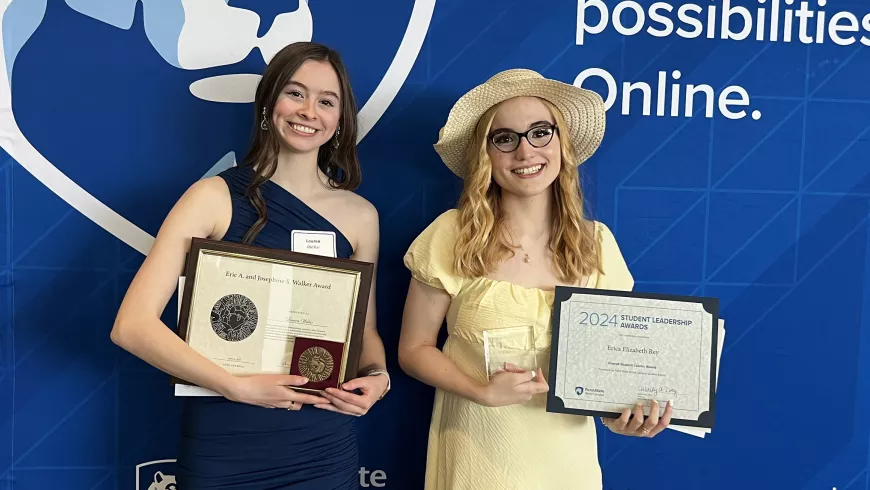Fully Online
with optional internship opportunities
Application deadline
Credits and costs
Gain Skills to Turn Your Ideas into Actionable Solutions
Identify pressing needs or discrepancies in communities through various methods of engagement and analysis.
Evaluate and measure community program and intervention efficacy.
Develop cooperative strategies and initiatives that improve community health.
Use research and data to understand and shape economic and social change.
Courses that Build upon Your Professional Experience
Courses that Build upon Your Professional Experience
Through a curriculum of theory and practice, you can learn to apply your knowledge and experience to the issues facing real communities. This master’s degree course list will explore the numerous intersections of community interest groups and the impacts these interactions have on the public.
The course topics include:
perspectives on development, democracy, and decision-making
economic development planning
structures and processes of communities and community organizations
land use, population change, and municipal finance
research conceptualization and data analysis
assessing and evaluating impacts
leadership and communication
Required Courses (24 credits)
- 3credits
Concepts, strategies, and techniques of local economic analysis, planning, and development; decision-making exercises.
- Prerequisite
an introductory course in economics
- 3credits
Social organization and change in communities; use of sociological principles in analysis of community problems and development.
- Prerequisite
6 credits in rural sociology, sociology, or psychology
- 3credits
Understanding theories, concepts, and frameworks of community and economic development and community decision-making models in application to community development practice and issues.
- 3credits
Exploration, understanding, and application of leadership roles, strategies, and principles in group and community settings.
- 3credits
Understanding the interaction of population characteristics, land use, municipal funds, and taxation in a locality and how they impact the operation and management of government jurisdictions.
- 3credits
Understanding and applying methods and hands-on experience with techniques used in community and economic development.
- 3credits
Course outlines the steps for students to apply CEDEV theories and methods to a topic in writing their master's paper.
- Note
CEDEV students should complete all of the other required courses before enrolling in CEDEV 580.
- 3credits
Descriptive statistics, hypothesis testing, power, estimation, confidence intervals, regression, one- and 2-way ANOVA, Chi-square tests, diagnostics.
Culminating Experience (3 credits)
- 3credits
Creative projects, including nonthesis research, that are supervised on an individual basis and that fall outside the scope of formal courses. CEDEV 596 is intended to provide a structure to allow CEDEV MPS students to work on their final paper or project. (CEDEV students need to complete CEDEV 580 before being enrolled in CEDEV 596.) MPS students can be registered in this course for 1, 2, 3, or 6 credits to work on and/or complete their final project report or paper. (CEDEV students need to be enrolled in at least 1 credit of CEDEV 596 during the semester in which they plan to graduate.)
Elective Courses (3 credits)
Electives (3 credits) are not limited to these courses and may include resident courses and graduate courses from other accredited institutions. Other possible elective courses require approval from the CEDEV graduate program coordinator or your MPS program faculty adviser.
- 3credits
This course is an overview of the field of planning. It examines the history of planning and the theories behind it, and the corresponding roles that planners can play in their communities. It establishes the legal framework for planning as a profession, and examines landmark legal cases involving planning and its tools.
- 3credits
Regional growth and development, focusing on challenges to theory, policy, and practice, emphasizing change in metropolitan, micropolitan, and rural areas.
- Prerequisites
CEDEV 430 and CEDEV 500
- 3credits
Understanding connections between communities and surrounding ecosystems; exploration of management techniques for building adaptive, resilient, and sustainable communities and environments.
- Prerequisite
Please contact the CEDEV program manager and academic adviser at [email protected].
- 3credits
Entrepreneurship in the Community, empirically and conceptually examines the relationship between entrepreneurs, small businesses, and local economic development. The course examines the multiple definitions of "entrepreneurship," and how these individuals affect — and are affected by — the social and economic dynamics of their community. The course develops a rich understanding of the entrepreneurship process from a community-based view rather than a traditional firm-based view, illustrating the many ways that entrepreneurs and their local society interact. The course begins by examining the role of the firm in society, and the ways that local life enhances and contains opportunity and opportunistic action. Students will also learn ways to measure small business dynamics locally, and develop an understanding of how different community development approaches may affect different types of entrepreneurship
- Prerequisite
CEDEV 430
- 3credits
Topics in Economic Development provides an overview of modern approaches to developing places and regions, including policy options and limitations; fundamental reasons for the worldwide decline of some rural areas and the growth of cities are also explored.
- Prerequisite
CEDEV 430 and STAT 500 or STAT 800
- 3credits
Launching ideas from socially and environmentally conscious for-profit businesses, to nonprofits, to spin-offs of existing models.
- Prerequisite
CEDEV 430
- 3credits
Provides a strong foundation in theories and concepts of international development that inform practice. Addresses issues of how economic growth and disparity are spatially distributed, differentiated, and what causes these patterns to occur.
Course Availability
If you're ready to see when your courses will be offered, visit our public LionPATH course search (opens in new window) to start planning ahead.
Advance Your Career

Advance Your Career
Because of the graduate degree program’s focus on your unique experiences within your community, you may be equipped to address the challenges and hurdles impacting your community right now.
Job Titles Related to This Degree
Many graduates pursue impactful careers in public entities including state and local governments, industrial and economic development authorities, chambers of commerce, utilities, and non-governmental organizations, as well as charitable arms of corporations. Many graduates also use their degree to increase their impact in their current positions.
The following roles are often held by people with this type of degree:
- Community Organizer
- Community Services Director
- Nonprofit Director
- Social Services Director
Employment Outlook for Occupational Fields Related to This Degree
Estimates of employment growth and total employment are provided by the U.S. Bureau of Labor Statistics and are subject to change. While these occupations are often pursued by graduates with this degree, individual outcomes may vary depending on a variety of factors. Penn State World Campus cannot guarantee employment in a given occupation.
Social and Community Service Managers
Career Services to Set You Up for Success

From the day you're accepted as a student, you can access resources and tools provided by Penn State World Campus Career Services to further your career. These resources are beneficial whether you're searching for a job or advancing in an established career.
- Opportunities to connect with employers
- Career counselor/coach support
- Occupation and salary information
- Internships
- Graduate school resources
Ready to Learn More?
Get the resources you need to make informed decisions about your education. Request information on this program and other programs of interest by completing this form.
Ready to take the next step toward your Penn State master's degree?
Costs and Financial Aid
Costs and Financial Aid
Learn about this program's tuition, fees, scholarship opportunities, grants, payment options, and military benefits.
Costs and Financial Aid
Graduate Tuition
Graduate tuition is calculated based on the number of credits for which you register. Tuition is due shortly after each semester begins and rates are assessed every semester of enrollment.
2025–26 Academic Year Rates
| How many credits do you plan to take per semester? | Cost |
|---|---|
| 11 or fewer | $1,037 per credit |
| 12 or more | $12,448 per semester |
Financial Aid and Military Benefits
Some students may qualify for financial aid. Take the time to research financial aid, scholarships, and payment options as you prepare to apply. Federal financial aid may only be used to pay for credits used to satisfy program requirements.
Military service members, veterans, and their spouses or dependents should explore these potential military education benefits and financial aid opportunities, as well.
Additional Cost of Attendance Details
To view the detailed list of cost of attendance elements:
- visit the Tuition Information site
- click the plus sign to expand the table
- select a semester from the World Campus row
Technical Requirements
Review the technical requirements for this program.
Earn a Valuable Credential along the Way

Earn a Valuable Credential along the Way
Show mastery of specific subjects before your degree is complete. Thanks to shared courses across programs, students can often earn a certificate along with their degree in less time than if they earned them separately.
Certificate Program Related to This Degree
Take graduate-level courses suitable for entry-level or mid-career professionals who wish to expand their abilities to positively influence the quality-of-life and development issues in urban neighborhoods, towns, small cities, and rural regions. The following certificate can be earned while completing this degree program:
Learn to identify and understand the interconnections between community entities, local governments, and businesses in this online graduate certificate program. Students can use their experience to think critically about community development and change.
Learn more about the Graduate Certificate in Community and Economic DevelopmentBecome a Dependable Leader in Community Change
Become a Dependable Leader in Community Change
You can use your knowledge and skills to become an advocate, organizer, volunteer, or publicly appointed servant on issues such as:
- housing
- social and economic justice
- community leadership development
- advocating for under-represented voices within the community
- community resiliency
- public safety and police
- land development planning
- refugee support
- economic development
- arts-based community development
- sustainable development
- community engagement
- environmental planning
Set Your Own Pace

Set Your Own Pace
Whether you are looking to finish your program as quickly as possible or balance your studies with your busy life, Penn State World Campus can help you achieve your education goals. Many students take one or two courses per semester.
Our online courses typically follow a 12- to 15-week semester cycle, and there are three semesters per year (spring, summer, and fall). If you plan to take a heavy course load, you should expect your course work to be your primary focus and discuss your schedule with your academic adviser.
To Finish Your Degree in One to Two Years
- Take 3–4 courses each semester
To Finish Your Degree in Two to Three Years
- Take 2–3 courses each semester
To Finish Your Degree in Three to Four Years
- Take 1 course each semester
Timelines may vary based on course availability.
Convenient Online Format
This program's convenient online format gives you the flexibility you need to study around your busy schedule. You can skip the lengthy commute without sacrificing the quality of your education and prepare yourself for more rewarding career opportunities without leaving your home.
A Trusted Leader in Online Education

Penn State has a history of more than 100 years of distance education, and World Campus has been a leader in online learning for more than two decades. Our online learning environment offers the same quality education that our students experience on campus.
Information for Military and Veterans

Are you a member of the military, a veteran, or a military spouse? Please visit our military website for additional information regarding financial aid, transfer credits, and application instructions.
How to Apply to Penn State

How to Apply to Penn State
Apply by September 30 to start January 12
Application Instructions
Deadlines and Important Dates
Complete your application and submit all required materials by the appropriate deadline. Your deadline will depend on the semester you plan to start your courses.
Spring Deadline
Apply by September 30 to start January 12Summer Deadline
Apply by March 15 to start May 18Fall Deadline
Apply by June 15, 2026, to start August 24, 2026
Steps to Apply
For admission to the J. Jeffrey and Ann Marie Fox Graduate School, an applicant must hold either (1) a baccalaureate degree from a regionally accredited U.S. institution or (2) a tertiary (postsecondary) degree that is deemed comparable to a four-year bachelor's degree from a regionally accredited U.S. institution. This degree must be from an officially recognized degree-granting institution in the country in which it operates.
GPA — All applicants are expected to have earned a junior/senior grade-point average of 3.0 or higher.
Related Undergraduate Course Work — In addition, applicants are expected to have completed 6 credits in social sciences, preferably 3 credits in economics and 3 credits in sociology, and 3 credits in statistics in undergraduate work.
Transfer Credit
You may transfer up to 10 graduate credits from another accredited program into the degree program, with approval.
You will need to upload the following items as part of your application:
Official transcripts from each institution attended, regardless of the number of credits or semesters completed. Transcripts not in English must be accompanied by a certified translation. If you are a Penn State alum, you do not need to request transcripts for credits earned at Penn State but must list Penn State as part of your academic history.
English Proficiency — The language of instruction at Penn State is English. With some exceptions, international applicants must take and submit scores for the Test of English as a Foreign Language (TOEFL) or International English Language Testing System (IELTS). Minimum test scores and exceptions are found in the English Proficiency section on the Fox Graduate School's "Requirements for Graduate Admission" page. Visit the TOEFL website for testing information. Penn State's institutional code is 2660.
References (3) — You will need to initiate the process through the online application by entering names, email addresses, and mailing addresses of three references. Upon submission of your application, an email will be sent to each reference requesting they complete a brief online recommendation regarding your commitment for success in an online program. Please inform all recommenders they must submit the form in order for your application to be complete.
When all materials have been received, we will notify you about your status and provide guidance about the next steps in becoming a Penn State student.
Program-Specific Questions/Materials
Résumé — Upload your résumé or vita or to the online application.
Personal Statement OR Statement of Purpose
To begin the online application, you will need a Penn State account.
Create a New Penn State Account
If you have any problems during this process, contact an admissions counselor at [email protected].
Please note: Former Penn State students may not need to complete the admissions application or create a new Penn State account. Please visit our Returning Students page for instructions.
You can begin your online application at any time. Your progress within the online application system will be saved as you go, allowing you to return at any point as you gather additional information and required materials.
- Choose Enrollment Type: "Degree Admission"
- Choose "WORLD CAMPUS" as the campus
Checking Your Status
You can check the status of your application by using the same login information established for the online application form.Applying as a Nondegree Graduate Student
Apply as a "nondegree" graduate student to begin taking courses right away. If you are taking courses as a nondegree graduate student, you must apply to the master's degree to be considered for admission into the Master of Professional Studies in Community and Economic Development. In the graduate school application:
- Select "Nondegree Admission"
- Choose "WORLD CAMPUS" as the campus
5. Complete the application.
Admissions Help
If you have questions about the admissions process, contact an admissions counselor at [email protected].
Contact Us

Contact Us
Have questions or want more information? We're happy to talk.
To learn more about the Master of Professional Studies in Community and Economic Development, please contact:
Administrative Coordinator
Community and Economic Development Graduate Program
305 Armsby Building
University Park, PA 16802
Phone: 814-865-6223
[email protected]
Community and Economic Development Graduate Programs website
Learn from the Best
Learn from the Best
This MPS program draws on the expertise of faculty in Penn State's Department of Agricultural Economics, Sociology, and Education. It was developed in response to a request from community development professionals for advanced training in theory, practice, and techniques in a community setting.
Faculty
Jeffrey Bridger
DegreePh.D., Rural Sociology, Penn StateDr. Jeffrey Bridger's research and teaching interests include community theory, community and economic development, sociological research methods, human dimensions of natural resources, and university-community engagement.
Judy Chambers
- DegreeM.S., Community and Economic Development, Penn State
- DegreeB.S., Education, Northwestern University
Judy Chambers is an economic and community development educator for Penn State Extension and has worked in the areas of organizational and leadership development, strategic planning, and local government training. In 2009–10, she served as Penn State Extension Fellow with the County Commissioners Association of Pennsylvania. She has more than 11 years of experience as municipal manager for two small communities in Boonsboro, Maryland, and Mercersburg, Pennsylvania. She also worked on military base reuse for Letterkenny Industrial Development Authority in Chambersburg, Pennsylvania.
Michael W-P Fortunato
- DegreePh.D., Rural Sociology, Penn State
- DegreeM.S., Community and Economic Development, Penn State
Dr. Michael W-P Fortunato's interests lie in entrepreneurship, social entrepreneurship, nontraditional and community-based ventures, community and economic development, rural development, community-based planning/strategy, institutional innovation, arts-based community development, agriculture/food-based community development, community theory, research design, and mixed methods.
Amanda Hope
DegreePh.D., Geography, West Virginia UniversityDr. Amanda Hope works for USDA Rural Development in Harrisburg, Pennsylvania, as the state energy coordinator and business program specialist. She began working for USDA Rural Development in 2011 as an intern while completing her doctorate in geography with an emphasis in rural economic development from West Virginia University. Her research interests include community economic development, economic development in Appalachia, and rural development. She teaches Community Economic Development 430.
Terence Milstead
- DegreePh.D., Urban and Regional Planning, Florida State University
- DegreeM.S.P., Urban and Regional Planning, Florida State University
- DegreeB.A., English, University of West Florida
Dr. Terence Milstead's primary teaching and research interest is the role of public participation, communication, and applied social science research in the creation or re-creation of public spaces. He is a vice president in the social change unit at Ogilvy Public Relations.
Frans J.G. Padt
- DegreePh.D., Political Sciences of the Environment, Radboud University Nijmegen
- DegreeM.S., Environmental Hydrology, Vrije Universiteit, Amsterdam
Dr. Frans J.G. Padt is an associate teaching professor and has more than 25 years of experience in community and regional environmental planning as a researcher, educator, policymaker, and consultant. He teaches in the Department of Agricultural Economics, Sociology, and Education and the Department of Landscape Architecture at the undergraduate and graduate levels. His research and teaching include natural resource and landscape governance; community science; planning; design; science, technology, and society studies; and public policy.
John Shingler
- DegreePh.D., Community Studies and Planning, Penn State
- DegreeM.S., Public Administration, Penn State
- DegreeM.S., Urban and Regional Planning, Florida State
- DegreeB.S., Man-Environment Relations, Penn State
Dr. John Shingler is a research associate whose research focuses on low-income assistance and energy conservation programs. His other interests lie in community studies and gentrification.
Bradley Woods
- DegreePh.D., Rural Sociology and Human Dimensions of Natural Resources, Penn State
- DegreeM.A., Sociology, Marshall University
- DegreeB.A., Sociology, Marshall University
Dr. Bradley Woods' experience includes teaching courses including Community Leadership, Sociology of Rural Life, Introduction to Sociology, Ethical Issues in Human Dimensions of Natural Resources, Ethical Issues in Big Data Research, and Ethical Conduct of Research. His research interests are leadership and management in the context of community, limitations on free speech and its impact on research and scholarly integrity, ethical issues in the conduct of scientific research and scholarship, and regulatory compliance and big data research.
News



